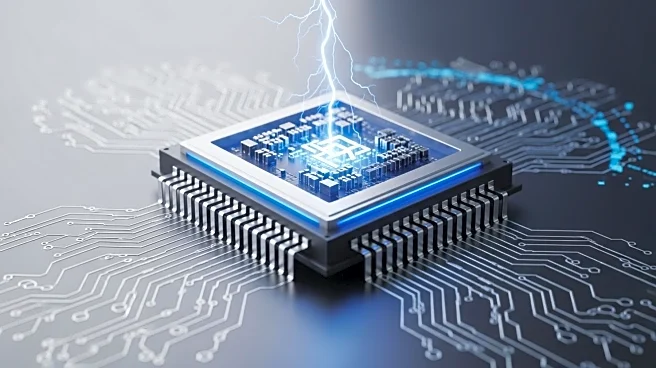What is the story about?
What's Happening?
NVIDIA has unveiled its latest Thor chip, designed to enhance the capabilities of high-level intelligent driving systems. The Thor chip, which boasts a maximum computing power of up to 2000 TOPS, is set to be mass-produced starting in 2025. This development comes as the penetration of intelligent driving systems in passenger cars continues to rise, with a significant increase in the installation rate of L2 and above intelligent driving SoCs in China. The Thor chip is expected to be integrated into various models, including Li Auto MEGA and Lynk & Co 900, among others. NVIDIA's Thor chip is available in multiple versions, with the Thor U version offering 730 TOPS computing power, attracting attention from passenger car manufacturers. The Thor X version, with 1000 TOPS computing power, is primarily used in Robotaxi scenarios, and some manufacturers are considering using it to build L3 autonomous driving systems.
Why It's Important?
The introduction of NVIDIA's Thor chip is a significant advancement in the intelligent driving market, potentially reshaping the landscape of autonomous vehicle technology. As automakers increasingly adopt high computing power chips, the Thor chip's capabilities could lead to more sophisticated and reliable autonomous driving systems. This development is crucial for the automotive industry, as it seeks to enhance safety and efficiency in driving. The Thor chip's ability to support complex operations and optimize driving trajectories could improve the overall driving experience and reduce traffic congestion. Additionally, the deployment of full-stack self-developed algorithm IP by chip vendors lowers the technical application threshold for OEMs, facilitating the integration of advanced technologies into vehicles.
What's Next?
As NVIDIA's Thor chip enters mass production, automakers are expected to accelerate the integration of these high computing power chips into their vehicles. This could lead to a surge in the development and deployment of L3 autonomous driving systems, enhancing the capabilities of intelligent driving systems. The automotive industry may witness increased collaboration between chip vendors and automakers to optimize the use of these advanced chips. Furthermore, the competition among chip vendors to capture the high-level intelligent driving market is likely to intensify, driving innovation and technological advancements in the sector.
Beyond the Headlines
The deployment of NVIDIA's Thor chip and similar high computing power chips could have broader implications for the automotive industry and society. As autonomous driving technology becomes more prevalent, ethical and legal considerations regarding safety, privacy, and liability may arise. The shift towards more advanced intelligent driving systems could also influence urban planning and infrastructure development, as cities adapt to accommodate autonomous vehicles. Additionally, the increased reliance on AI-driven systems may prompt discussions on the role of human oversight and the potential impact on employment in the transportation sector.
















